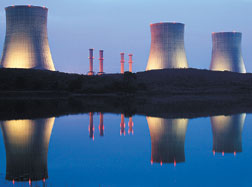...in the 1970s with subcontracts in Libya. Competitors soon followed but many ran into trouble. “They signed a lot of contracts with unknown authorities, and they were either not paid or had other problems,” says Gercek. “Most of them quit and came back.” But Enka prospered, expanding its presence across the Middle East with large industrial, pipeline, infrastructure and power projects, he says.
Today, half of Enka’s earnings come from power generation, says Gercek. Its 3,850 MW of generating capacity, with secure sales contracts, provides a long-term base load of income. Construction is the firm’s next largest business, including specialty subcontractors. Steel fabrication, real estate and the tailings of a Russian retail business now being sold round out the Enka empire. It employs about 40,000 globally and expects revenue to grow 16% this year, says Gercek. The firm claims a $7-billion backlog.
 Enka Construction Enka is seeking to build Turkey’s first nuclear powerplant.
|
Enka’s foray into Russia began in 1986 in a services-for-gas trade deal between the Turkish and Soviet governments. “There was a big competition [between] six Turkish companies,” says Gercek “It was a real bid and it was harsh.” The gas deal ended after the Soviet breakup but it gave Enka a footing in a market with little serious local competition until recently, says Gercek. “A new generation of local contractors is winning projects but they are still not significant,” he adds.
Changes in the collapsing Communist world generated substantial business for Enka in apartment and hospital construction in Russia and in Moscow real estate. “We earned a lot of money, did a good job and had a good name in the market,” Gercek says. Enka’s growing prominence was a factor in the Russian government selecting it in 1993 to restore the former parliament building in Moscow, known as the White House, that was gutted in a failed coup attempt. “They asked us to come on a negotiation basis,” he says. “They ordered us to build immediately in three months.” Enka imported thousands of Turkish workers and completed the $100-million job on time, Gercek says.
The Enka executive says most building projects in Russia’s private sector now are negotiated. “You build up a reputation that you can deliver the project on time with quality and without problems, and they start to call you,” he says. Enka’s expertise includes an in-house team of architects and engineers. “They are very good engineers,” says Zborovsky of Thornton-Tomasetti.
Long Relationships
Enka has forged an even longer relationship with another U.S. firm, San Francisco-based Bechtel Group, which dates to the 1970s when former Chairman Stephen D. Bechtel Jr. and Sarik Tara first met in Saudi Arabia.
The firms lost a bid for Turkey’s Ataturk dam in the 1980s but negotiated a design-build highway contract in Ankara in 1986. They are now working on $5 billion of road jobs in Albania and Romania, and natural-gas projects in Kazakhstan’s Tengiz field and Russia’s Sakhalin Island. “It is a real partnership in all fields at all levels,” says Gercek. Adds Bechtel President and Chief Operating Officer Bill Dudley: “Successful joint-venture partners share more than risk. They share values and trust. That has been key to the success of Bechtel-Enka projects. We want the challenge of the toughest jobs and are confident in our combined ability to deliver on time, safely and with quality.”
 Enka Construction Terminal being built by Enka at Moscow’s international airport will serve 3,800 passengers per hour and is set for completion in February.
|
But Enka is still reluctant to participate in Turkey’s emerging build-operate-transfer market for civil infrastructure, including a Bosporus tunnel. “There are certain risks we do not want to take,” Gercek says. Enka has been happier with build-own-operate contracts used since the early 1990s to develop powerplants. For these, the government guarantees payments, leaving the firm to manage construction and operating risks.
Enka is now taking a leap in that sector by targeting a BOO contract for Turkey’s first nuclear powerplant, a 4,000-MW facility at Akkuyu, with Korea Electric Power Corp. leading a 60:40 joint venture. Enka plans to submit project finance proposals this year. “We hear the French, Russians and some Americans [will bid], just rumors,” Gercek says.
But Gercek is still in no hurry to take Enka’s focus off Moscow despite political uncertainties. “We don’t feel embarrassed about this,” he says, confident of continuing business. Zborovsky agrees. The firm’s market share may diminish, he says, “but I think there is plenty of work for Enka for years to come.”

Post a comment to this article
Report Abusive Comment